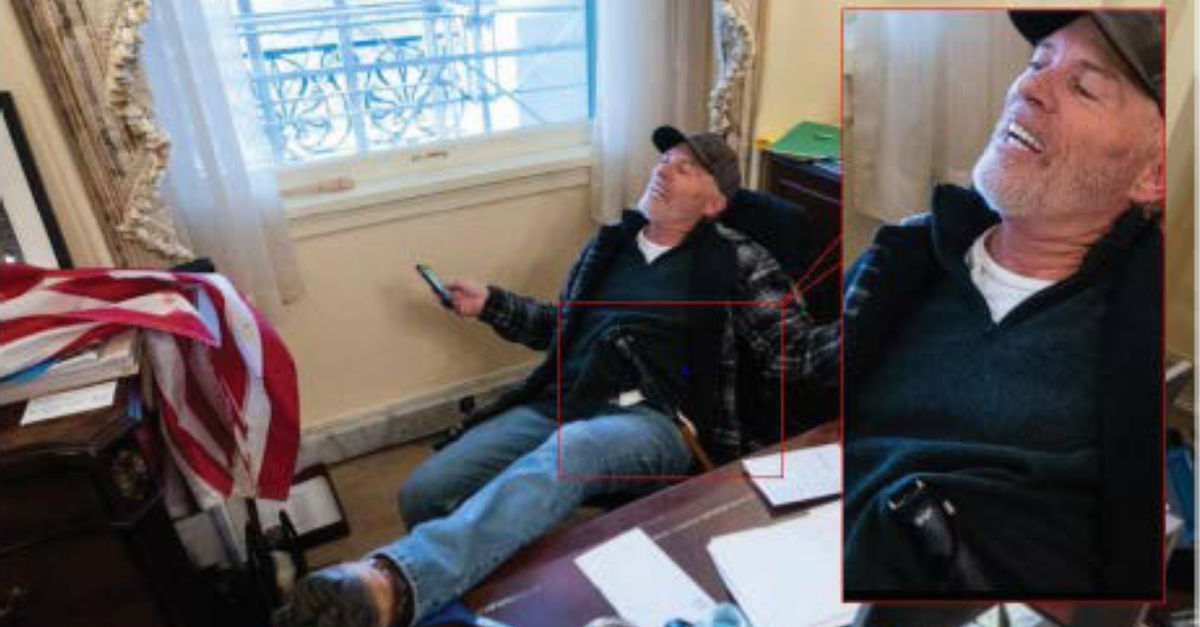
Richard Barnett, who kicked up his feet on a desk in Speaker Pelosi’s office, allegedly had a stun gun at the time.
Federal prosecutors asked for–and received–additional time to work on the government’s case against one of the highest-profile Jan. 6 defendants during an appearance in federal court on Tuesday.
Richard “Bigo” Barnett is the man infamous for leaning back in a chair and resting his feet on a desk in House Speaker Rep. Nancy Pelosi’s (D-Calif.) office during the pro-Trump riot at the U.S. Capitol Complex.
The defendant was charged on Jan. 8 with knowingly entering or remaining in any restricted building or grounds without lawful authority; violent entry and disorderly conduct on Capitol grounds; and theft of public money, property, or records.
Citing “particularly voluminous” discovery in the case against Barnett and the other Capitol Hill riot suspects, Assistant U.S. Attorney Mary Dohrmann said in court on Tuesday that the government has been unable–due to the technical limitations that come with thousands of computer files concerning over 1,000 defendants–from providing all of the relevant information to the defense as of now.
During this portion of the hearing the defense kept mum and did not raise any concerns about the pace of electronic discovery.
Dorhmann added that the government is working on setting up a comprehensive database–which might become several smaller databases–that contain relevant evidence in the Jan. 6 cases but said that this preferred technology solution has proven elusive so far.
Because some of the necessary information in the cases includes not easily searchable items “like police bodycam footage,” Dohrmann said, there have been issues with making sure to identify all of the potentially relevant information. The prosecutor also claimed the government wants the information to be “accessible, comprehensive” and said that the government intends for the defense to be able to access the databases when they are eventually up and running.
U.S. District Judge Christopher R. Cooper asked if a third-party designer would be constructing the database. Appearing reticent to answer directly, Dorhmann said the “short answer is ‘Yes.'”
“A third-party vendor,” will construct the Jan. 6 database, the government attorney conceded.
The defense also stayed silent during the court’s interrogation of the prosecution and did not raise concerns about that discussion either.
Attorney Joseph Daniel McBride did, however, note one extant issue for the court’s consideration that had been troubling the defense.
Barnett’s team wants to conduct walk-throughs of the U.S. Capitol Building, McBride noted. He said the defense has been able to make their way through most of the building but complained that certain, unidentified, areas were not accessible and requested a second walk-through as well as a court order to force compliance.
The court and the government both noted this was an issue that had never been raised before. The government said they didn’t know if full access to certain rooms in the Capitol would ever be accessible to defense attorneys. Cooper said he will consider the request.
The defendant’s brief appearance closed with a quick discussion about speed-of-trial considerations. The government, for their part, said they simply needed more time to prepare their case. The defense, again, did not object or have much to say about the issue. In agreement, all three sides will reconvene in 90 days’ time.
Barnettt’s next court appearance is slated for Nov. 23 at 9:00 a.m. EST.
“Nancy, Bigo was here, you bitch,” prosecutors allege the defendant wrote on a slip of paper left in the San Francisco Democrat’s office.
Defense attorneys have contested that interpretation of the message and pointed out in court filings that the notorious note has no commas. It actually says: “Hey Nancy Bigo was here biatd.”
The self-described “white nationalist,” his attorneys say, was only trying to refer to Pelosi as a “biatch,” a less-offensive and slang iteration of “bitch,” but he either misspelled the word or wrote it too hastily, rendering an attempted “c” and “h” into a “d.”
Federal authorities also allege that Barnett brought a stun gun into the Capitol–and Pelosi’s office–on the day in question. The defendant has directly addressed the theft charge in the press by saying that he left the powerful legislative leader a quarter for an envelope he took.
“I picked up the envelope, and put it in my pocket, and I put a quarter on the desk,” he told Fort Smith, Ark.-based CBS affiliate KFSM earlier this year. “Because I’m not a thief.”
Alberto Luperon, Adam Klasfeld, Jerry Lambe and Matt Naham contributed to this report.
[images via U.S. Department of Justice]